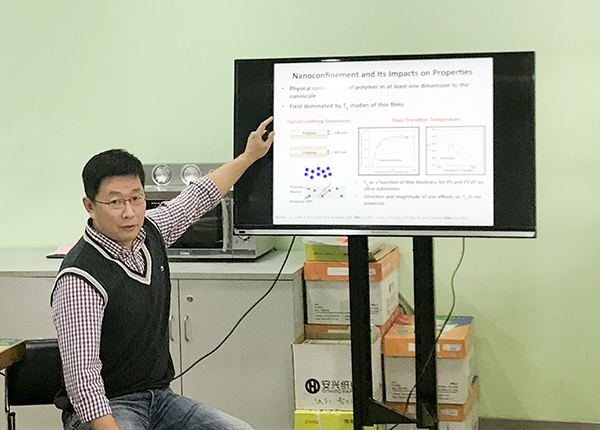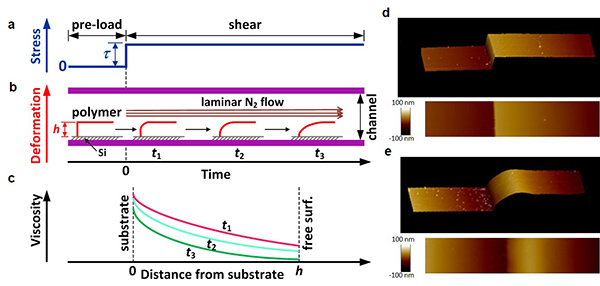The University of Michigan-Shanghai Jiao Tong University Joint Institute (UM-SJTU JI) stands at the forefront of technological innovation with its unique academic atmosphere and advanced scientific explore. JI boasts a strong research team which keeps innovating and strives to produce results that will lead the industry and ultimately benefit the human beings.
In order to help the public discover the mystery of scientific research, JI has launched a series of mini-workshop to introduce its faculty’s research.

At a recent mini-workshop, Dr. Yunlong Guo presented his research progress in the measurement of spatially distributed rheological properties of supported thin polymer films.
Owing to the size effect and surface/interfacial effect, many physical properties of nanomaterials dramatically deviate from their bulk state to accommodate the confining geometry. Under nanoconfinement, polymers exhibit a remarkable characteristic of spatially-distributed properties near interfaces, which was originally claimed by Nobel Laureate de Gennes when he attempted to develop a model of glass transition temperature (Tg) for thin polymer films and was experimentally confirmed by ingenious measurements on Tg by Torkelson and co-workers.
Despite the significant scientific efforts devoted to the deviation of Tg by nanoconfinements, an apparently urgent demand on “how mechanical properties are changed by the proximity of interfaces” has not been adequately investigated and many contents need to be elucidated. For instance, the time-dependent thermoviscoelastic response of supported thin polymer films has not yet been explored.
 Testing the thermal viscoelasticity of nanofilms
Testing the thermal viscoelasticity of nanofilms
In line with distributed properties detected in Tg studies, Guo’s lab shows that interfacial effect causes gradient variation of rheological response in supported thin polymer films, obeying a layer-by-layer manner from free surface to the material interior. This is achieved by exploiting a previous non-contact approach to determine thermoviscoelastic properties via applying a controlled stress and measuring the resulting time-dependent strain. By varying the stress level and observation time scale within a temperature range, the group was able to obtain several breakthrough findings as follows: the spatial distribution of effective viscosity along the direction of film thickness, the Vogel-Fulcher-Tammann temperature dependence of the effective viscosity, mobility induced shear thinning in the vicinity of free surface, and the associated spatial distribution of the shear thinning effect.
Guo’s work directly monitored the shear response of supported thin polymer films. The properties focused herein are crucial for understanding lubrication, adhesion, and instabilities, which are prominent in emerging technologies including nanoimprint, advanced coating, and developing biocompatible materials. Guo addressed some fundamental problems for a better understanding of the mechanical properties of polymers on the nanoscale.
 Dr. Yunlong Guo received his Bachelor and Master degrees from the Department of Automotive Engineering at Tsinghua University in 2000 and 2003 respectively. He obtained a Ph.D. in Mechanical Engineering from the University of Louisville in 2009. Dr. Guo served successively as Visiting Scholar and Postdoctoral Research Associate at Northwestern University and Princeton University from 2009 to 2012. He was promoted to Associate Research Scholar at Princeton University in 2012. Professor Guo joined Shanghai Jiao Tong University (SJTU) in September 2014 as a Special Researcher and Ph.D. Student Supervisor. He is also co-appointed by the University of Michigan – Shanghai Jiao Tong University Joint Institute and the School of Materials Science and Engineering of SJTU. Professor Guo’s research interests include glass transition; physical aging and stability; dynamics and rheology of polymers.
Dr. Yunlong Guo received his Bachelor and Master degrees from the Department of Automotive Engineering at Tsinghua University in 2000 and 2003 respectively. He obtained a Ph.D. in Mechanical Engineering from the University of Louisville in 2009. Dr. Guo served successively as Visiting Scholar and Postdoctoral Research Associate at Northwestern University and Princeton University from 2009 to 2012. He was promoted to Associate Research Scholar at Princeton University in 2012. Professor Guo joined Shanghai Jiao Tong University (SJTU) in September 2014 as a Special Researcher and Ph.D. Student Supervisor. He is also co-appointed by the University of Michigan – Shanghai Jiao Tong University Joint Institute and the School of Materials Science and Engineering of SJTU. Professor Guo’s research interests include glass transition; physical aging and stability; dynamics and rheology of polymers.





